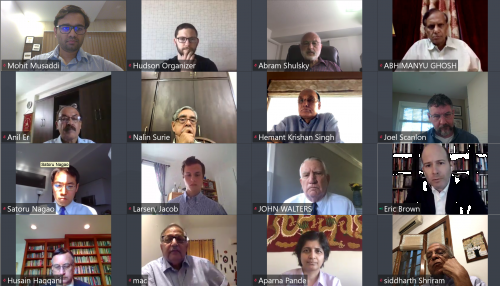DPG-Hudson Institutional Dialogue on Himalayan Standoff and India-US Partnership in the Indo-Pacific
On June 26, 2020, the Delhi Policy Group held a virtual institutional dialogue with the Hudson Institute on the broad theme Himalayan Standoff: India-US Partnership in the Indo-Pacific. Discussions focused on the India-China military standoff along the LAC in Ladakh and prospects for advancing the India-US partnership in the Indo-Pacific amidst growing disruptions to the regional and global order.
There was detailed discussion on the drivers of China’s aggression along the LAC and the prevailing outlook. China’s “salami-slicing tactics” in both continental and maritime domains and the growing China-Pakistan collusive nexus were examined.
The dynamics of upcoming elections in the United States and the impact on US foreign policy was discussed. Speakers examined the contest between neo-isolationist and globalist world views in the US. It was pointed out that recent Congressional legislation such as the Uyghur Human Rights Policy Act (2020) and the Hong Kong Human Rights and Democracy Act (2019) indicates a growing bipartisan consensus in the US political system on the challenge posed by Beijing. Speakers also noted that the fundamental assumption that growing economic interactions with China will not undermine America’s interests had been emphatically overturned in the recent past.
The potential of the recently upgraded Comprehensive Global Strategic Partnership between the United States and India was highlighted. Speakers referred to the growing bilateral defence partnership and called for an increase in the number and regularity of mid-level defence exercises to complement major exercises like Malabar and Tiger Triumph.
There was a view that the fate of the Indo-Pacific would be determined by India’s success in holding off China in the Himalayas. Quad countries need to understand the conceptual link between Chinese aggression in the Himalayas and its actions elsewhere, such as in Xinjiang, Hong Kong, and the South China Sea. However, it was also pointed out that while the Quad is a useful forum for security dialogue, the viability of the Quad as an effective instrument of dissuasion and moderation remains in question. Meanwhile, it was necessary to ensure that ASEAN nations retain independent agency and do not succumb to China’s coercive pressures. Secretary Pompeo’s remarks that China’s military threats necessitate the repositioning of US forces to counter the PLA were welcomed. It was emphasised that India and the US must validate their strategic partnership through a more visible, purposeful and coordinated bilateral approach towards advancing clearly identified and shared interests across the Indo-Pacific.



